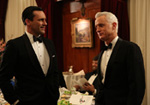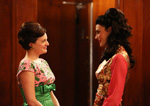Article first published as Mad Men Episode 6: “The Flood” on Blogcritics.
“The Flood” takes Mad Men down a river of shock, sadness, and disillusionment. Dr. King’s assassination in April 1968 is a tragic event that hits the nation hard, and it permeates the entire episode. The assassination touches everyone in different ways and exposes a wide array of feelings and reactions. Everyone’s personal and business worlds are disrupted. A usually upbeat and  celebratory advertising awards show gets derailed, but the ceremony goes on despite the tragedy. The next day, business at SCDP also slows down as the agency closes early but Roger and Don manage to keep their appointment with Roger’s real estate friend. Peggy and Don each try their awkward best to be comforting and supportive to their respective African American secretaries. Peggy hugs her secretary, Phyllis, and sends her home. Don offers Dawn hollow words of support and tells her to go home, but she elects to stay at the office. Even Peggy’s and Betty’s next big life-stage events are influenced by that fateful day.
celebratory advertising awards show gets derailed, but the ceremony goes on despite the tragedy. The next day, business at SCDP also slows down as the agency closes early but Roger and Don manage to keep their appointment with Roger’s real estate friend. Peggy and Don each try their awkward best to be comforting and supportive to their respective African American secretaries. Peggy hugs her secretary, Phyllis, and sends her home. Don offers Dawn hollow words of support and tells her to go home, but she elects to stay at the office. Even Peggy’s and Betty’s next big life-stage events are influenced by that fateful day.
The Show Must Go On. Really?
With the Heinz encounter behind them, Don and Peggy cross paths at the ANDY awards ceremony sponsored by the Advertising Club of New York. This event actually did take place on the evening of Dr. King’s assassination and the depiction of the ceremony on Mad Men captures the essence of what transpired that evening. Here’s a little background as context.
The Advertising Club of New York officially took on its name in 1915 and still exists as one of the industry’s premiere associations.  Many of the giants of the business from both the agency and client sides were members. Creative awards were, and still are, very important on Madison Avenue and the Ad Club awards were sought after recognitions. In 1964 the Ad Club established the ANDY Awards and the 4th Annual awards ceremony in 1968 was hosted by the club’s president, William T. Leslie of TWA. Paul Newman was, in fact, the guest speaker and his talk was interrupted by the news of the assassination. The legendary NY Timesadvertising columnist Phil Dougherty covered the event and wrote about it this way. “ The news came after dinner had been served and Paul Newman, the actor had just finished a light-hearted appeal for Senator Eugene J. McCarthy. A man stood amid the formally dressed assemblage in the Grand Ballroom and asked ‘Do you know, Mr. Newman, sir, that Martin Luther King is dead, sir? What do you have to say?’ The actor was plainly shocked. He returned to his seat on the dais without a word. The program was halted for about 10 minutes as many people rushed to the phones.” Phil went on to write “When the program resumed the mood was more somber.” Don captured that moment in his own dispassionate style. When asked if he was returning to the ceremony he replied “What else is there to do?
Many of the giants of the business from both the agency and client sides were members. Creative awards were, and still are, very important on Madison Avenue and the Ad Club awards were sought after recognitions. In 1964 the Ad Club established the ANDY Awards and the 4th Annual awards ceremony in 1968 was hosted by the club’s president, William T. Leslie of TWA. Paul Newman was, in fact, the guest speaker and his talk was interrupted by the news of the assassination. The legendary NY Timesadvertising columnist Phil Dougherty covered the event and wrote about it this way. “ The news came after dinner had been served and Paul Newman, the actor had just finished a light-hearted appeal for Senator Eugene J. McCarthy. A man stood amid the formally dressed assemblage in the Grand Ballroom and asked ‘Do you know, Mr. Newman, sir, that Martin Luther King is dead, sir? What do you have to say?’ The actor was plainly shocked. He returned to his seat on the dais without a word. The program was halted for about 10 minutes as many people rushed to the phones.” Phil went on to write “When the program resumed the mood was more somber.” Don captured that moment in his own dispassionate style. When asked if he was returning to the ceremony he replied “What else is there to do?
Megan and Peggy are up for creative awards for work done while they were at SCDP. While awards are given to agencies, the  creative teams responsible for the advertising are also named on the awards. Neither SCDP nor CGC had any other entries in consideration so Megan and Peggy both had a shot at taking the stage. Megan and Peggy chat and Peggy points out that SCDP’s only nominees — herself and Megan — no longer work there. Megan adds, “And the Heinz beans client is gone too.” Neither of them wins. That’s advertising. As far as the actual awards handed out that night, Doyle Dane Bernbach (The agency that lost the Heinz Ketchup business) and Young & Rubicam were the big winners with each taking home thirteen awards. DDB won the most first place finishes with six including awards for Volkswagen, Buitoni, and Jamaica Tourism. Coincidently, the agency I joined as a partner in 1973, Delehanty, Kurnit & Geller (DKG), was the third biggest overall winner with six awards.
creative teams responsible for the advertising are also named on the awards. Neither SCDP nor CGC had any other entries in consideration so Megan and Peggy both had a shot at taking the stage. Megan and Peggy chat and Peggy points out that SCDP’s only nominees — herself and Megan — no longer work there. Megan adds, “And the Heinz beans client is gone too.” Neither of them wins. That’s advertising. As far as the actual awards handed out that night, Doyle Dane Bernbach (The agency that lost the Heinz Ketchup business) and Young & Rubicam were the big winners with each taking home thirteen awards. DDB won the most first place finishes with six including awards for Volkswagen, Buitoni, and Jamaica Tourism. Coincidently, the agency I joined as a partner in 1973, Delehanty, Kurnit & Geller (DKG), was the third biggest overall winner with six awards.
Business As Unusual
The next day at SCDP the frayed nerves and shock of the evening before linger and collide with the reality of agency business. Harry and Pete get into a dust up about make-goods and protecting the agency’s revenue. Normally this would be a commonly shared priority between accounts and media but it takes on a different tenor. When events like the MLK assassination happen the networks preempt their regular programming with news coverage. The commercials that would have aired in the regularly scheduled programs do not run. The networks offer to run those commercials at later dates, thereby making up for the preempted media exposure. Make-goods work out well for everyone and protect the agency’s commission income. When an agitated Harry meets Pete and Bert he complains about the news interrupting primetime shows like Merv and Bewitched and clients’ pressuring him to take credits instead of make-goods. This means that SCDP will loose revenue. Pete yells at Harry for being selfish and racist saying, “This cannot be made good. It’s shameful. It’s a shameful,shameful day.“ Bert convinces Harry to shake hands with Pete, who says, “I’m sure you can make your money back on some Movie of the Week next Fall about the death of a great man.” So, it is possible for Pete to care about something other than winning and money.
At the ANDY awards Roger introduces Don to a potential real estate client and they agree to a meeting the next day. They keep the appointment despite the turmoil and have what can only be described as surreal meeting. Roger’s friend talks eerily about how all the turmoil is heaven’s way of telling us to change and seize the moment. He describes his idea for a property insurance ad: “Our name and a Molotov cocktail being lit with a match. And then a coupon at the bottom.” Even Roger is bewildered. Time to go home.
Peggy And Betty Get Ready For A Move
Peggy is ready to place a bid on a “Way-Upper” East Side apartment a few blocks from 96th Street. In 1968, 96th Street was the dividing line between the fashionable Upper East Side and the less desirable neighborhoods to the North. Peggy is convinced by her real estate agent to take advantage of the unrest in the city and place a lowball bid of $25,000 on the apartment (That wouldn’t buy a parking spot there today). When the bid falls through Abe tells Peggy that he’s glad because he thinks they should “raise their kids” in a less formal, more diverse neighborhood like the Upper West Side. Peggy takes genuine comfort in his feelings and seems ready to make that move with Abe. I was a long time Upper West Side resident starting in the mid 1970s. It is a great neighborhood. Peggy and Abe should be very happy there.
Betty is also preparing for a move that may take her even further away from New York City. Henry is a career politician who works for the very popular, charismatic New York Mayor, John Lindsay. Henry joins the Mayor on a walk through Harlem to help calm the riots. Henry is critical of Mayor Lindsay’s political wheeling and dealing and tells Betty. “It was terrifying. Walking into that crazy, angry crowd, and Lindsay smiling like he was going to a pancake breakfast.” Henry is convinced that it’s time to blaze his own path and he tells Betty he’s been offered a New York State Senate seat. They agree that he should seize the opportunity and Henry tells Betty, “I can’t wait for people to really meet you.” As Betty contemplates getting back into her smaller dress size we’re left to wonder which Betty people will meet. How this move will affect Don’s relationship, or lack of it, with his kids is a bigger question.
1968 has just begun. Unrest and uneasiness is everywhere. What will Spring and Summer bring?
